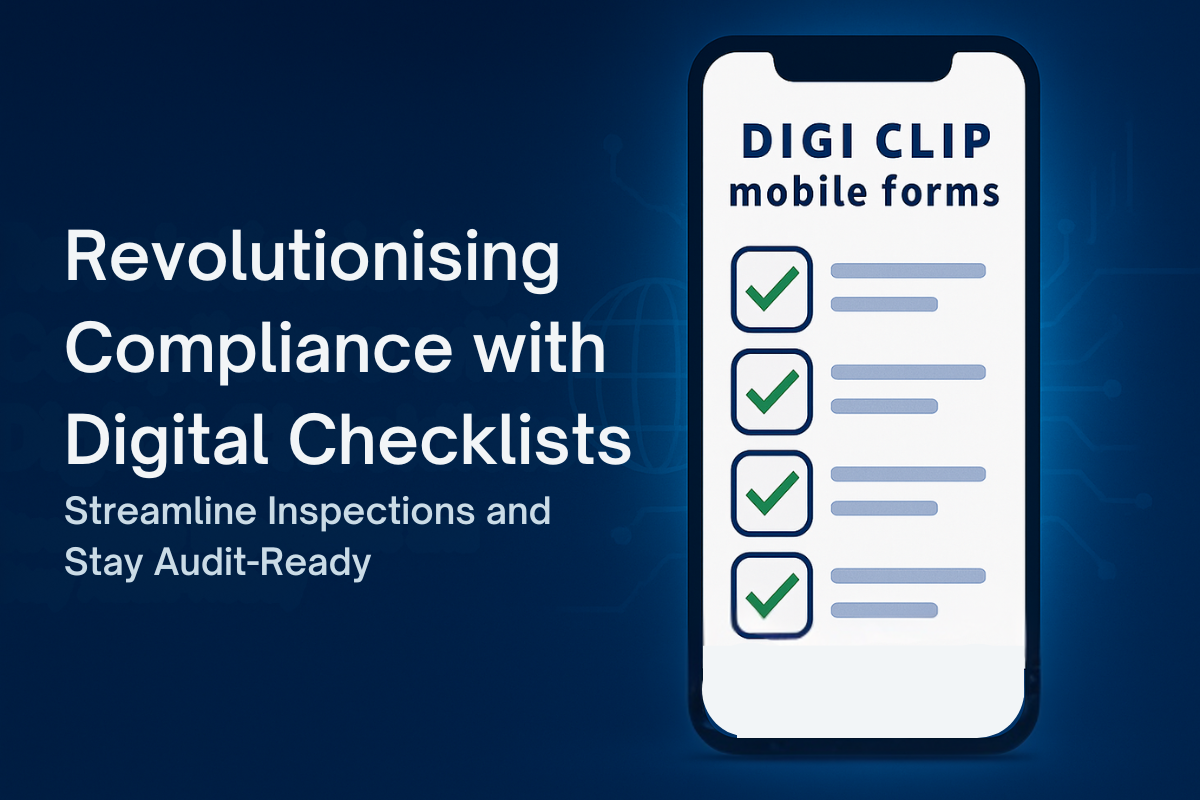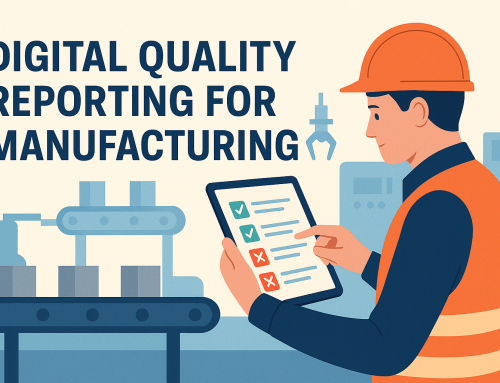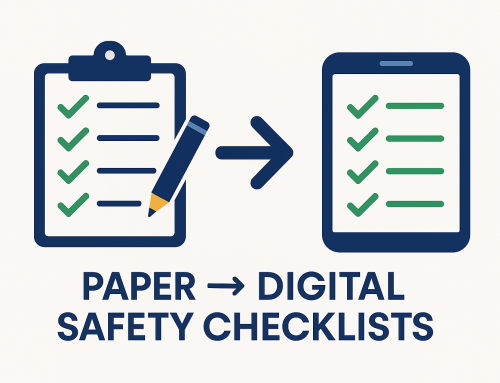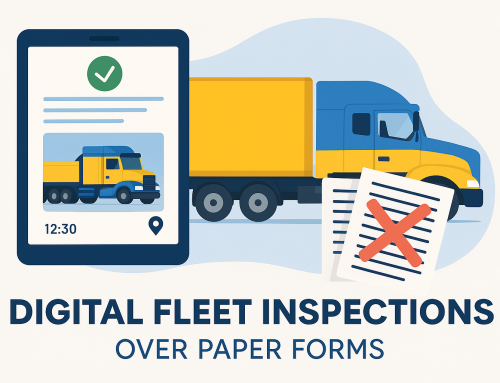What Is Audit Automation Software and How Does It Work?
Audit automation software — also known as digital audit software — is transforming how organisations manage audits. By replacing paper-based checklists with automated workflows, businesses can streamline compliance processes, improve accuracy, and reduce manual effort. Whether you’re conducting internal audits, compliance reviews, or external assessments, audit automation empowers teams to maintain high standards and meet regulatory requirements efficiently.
Table of Contents
- Types of Auditing Software
- Key Benefits of Audit Automation Software
- Challenges of Audit Automation Software
- How to Choose the Best Auditing Software
- Industries That Benefit Most
- How Digital Checklists Enhance Audit Automation
- DIGI CLIP Mobile Forms: Your Digital Audit Solution
- FAQs
- Conclusion
Types of Auditing Software
1. Internal Auditing Software
Internal audit tools help businesses assess operations, safety, and regulatory compliance. They typically include:
- Audit planning and scheduling for routine checks
- Real-time data collection via mobile checklists
- Corrective action tracking for non-compliance issues
Example: A logistics company used internal auditing software to streamline pre-start vehicle checks, reducing compliance breaches by 40%.
Learn more about vehicle pre-start inspections and digital fleet safety checklists.
2. Compliance Auditing Software
This software ensures adherence to industry-specific regulations, such as ISO standards, workplace safety laws, and financial reporting requirements. Features include:
- Regulatory tracking to stay updated with changing laws
- Automated alerts for upcoming audits and renewals
- Real-time dashboards for compliance visibility
Example: A food manufacturer implemented digital compliance auditing tools to meet HACCP and FSANZ requirements, avoiding penalties and improving food safety documentation.
Read more about HACCP compliance and digital workplace safety checklists.
3. External Auditing Software
External auditing software facilitates audits by government bodies, ISO assessors, or third-party regulators. Benefits include:
- Centralised audit reports for easy historical access
- Audit evidence tracking for full documentation
- Customisable templates for standardised procedures
Key Benefits of Audit Automation Software
- Increased Efficiency: Automation reduces administrative overhead and accelerates compliance workflows.
- Improved Accuracy: Digital forms minimise human error and ensure consistent data collection.
- Enhanced Collaboration: Cloud platforms keep audit teams aligned with real-time updates.
- Greater Transparency: Dashboards provide visibility into audit outcomes and compliance trends.
- Cost Savings: Reducing manual effort and compliance breaches lowers overall operational costs.
Explore how digital inspection apps enhance compliance management.
Challenges of Audit Automation Software
- Initial Setup Costs: Implementation may require investment, but long-term efficiency offsets it.
- User Adoption: Training and change management are key for successful adoption.
- Data Security: Choose cloud platforms with encryption and MFA for audit data protection.
How to Choose the Best Auditing Software
When selecting audit automation software, assess:
- Industry Fit: Ensure alignment with your sector’s compliance standards.
- Mobile Compatibility: Verify that audits can be conducted on smartphones and tablets.
- Customisable Checklists: Look for flexible templates for tailored audits.
- Integration: Ensure compatibility with existing compliance or ERP systems.
- Support & Training: Opt for providers offering onboarding and ongoing assistance.
Learn how SMBs can migrate from paper to digital compliance tools.
Industries That Benefit Most
1. Logistics & Transportation
Ensures pre-start checks, driver compliance, and Chain of Responsibility (CoR) audit readiness.
Discover how digital checklists support transport compliance.
2. Manufacturing & Warehousing
Automates maintenance logs, safety inspections, and ISO certification tracking for consistent compliance.
See how digital checklists streamline manufacturing audits.
3. Healthcare & Aged Care
Supports hygiene inspections, patient safety audits, and accreditation readiness.
4. Food & Beverage
Facilitates HACCP compliance, supplier assessments, and food safety verification.
How Digital Checklists Enhance Audit Automation
Digital checklists are at the heart of modern audit workflow automation. They ensure:
- Real-time data capture for audit traceability
- Mobile accessibility for on-site auditing
- Automated alerts for corrective actions
- Centralised records for compliance verification
Explore industry-specific digital checklist solutions.
DIGI CLIP Mobile Forms: Your Digital Audit Solution
DIGI CLIP Mobile Forms provides customisable digital checklists that simplify audits, inspections, and compliance management. With real-time data capture, cloud-based storage, and smart automation, businesses can:
- Improve audit accuracy and consistency
- Reduce compliance risk and costly breaches
- Monitor corrective actions in real time
✅ No credit card required | ✅ Full feature access | ✅ Set up in minutes
Frequently Asked Questions (FAQs)
What is audit automation software?
Audit automation software digitises and automates audit processes, replacing paper-based systems with real-time, cloud-based tools for efficiency and accuracy.
How does digital audit software improve compliance?
By providing automated workflows, corrective action tracking, and centralised records, it helps organisations maintain continuous compliance and audit readiness.
What industries benefit most from audit automation?
Industries such as logistics, manufacturing, healthcare, and food production gain the most from streamlined audit automation tools.
Can audit automation software integrate with other tools?
Yes, most platforms integrate with ERP, compliance, or quality management systems to provide seamless data flow.
What features should I look for in audit automation solutions?
Look for mobile accessibility, custom templates, analytics dashboards, and secure cloud storage with encryption.
Conclusion: Drive Compliance and Efficiency with Audit Automation
Audit automation software is revolutionising how organisations maintain compliance, manage risks, and execute internal audits. By digitising checklists, automating workflows, and centralising data, businesses can ensure audit accuracy, enhance accountability, and reduce time spent on manual reporting. Whether you operate in logistics, manufacturing, healthcare, or food production, digital audit solutions like DIGI CLIP Mobile Forms empower you to maintain compliance effortlessly and with confidence.
If you liked this post? Why not share it!








Leave A Comment